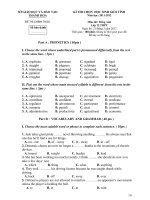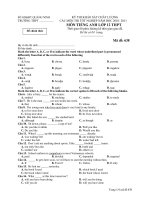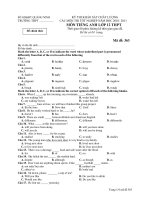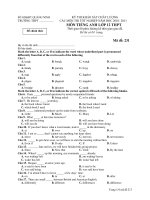Đề thi chọn học sinh giỏi cấp tỉnh năm học 2012-2013 môn tiếng anh – lớp 12 - THPT
Bạn đang xem bản rút gọn của tài liệu. Xem và tải ngay bản đầy đủ của tài liệu tại đây (916.7 KB, 9 trang )
Page 1/7
UBND TỈNH BẮC NINH
SỞ GIÁO DỤC VÀ ĐÀO TẠO
ĐỀ THI CHỌN HỌC SINH GIỎI CẤP TỈNH
NĂM HỌC 2012 – 2013
MÔN THI: TIẾNG ANH - LỚP 12 - THPT
Thời gian làm bài: 180 phút (không kể thời gian giao đề)
Ngày thi 29 tháng 3 năm 2013
================
Điểm bài thi Giám khảo 1 Giám khảo 2 Số phách
Bằng số:
Họ tên:
Họ tên:
Bằng chữ:
Chữ ký:
Chữ ký:
* Ghi chú: Đề thi gồm 07 trang. Thí sinh làm bài trực tiếp vào đề thi.
PART I: PHONETICS (1 point)
I: Find a word in each line whose underlined part is pronounced differently from that of the other
three by circling A, B, C or D. (0.5 p)
1
A
allegedly
B
confusedly
C
supposedly
D
wickedly
2
A
youths
B
maps
C
cigarettes
D
months
3
A
equation
B
television
C
mention
D
decision
4
A
rise
B
rinse
C
browse
D
bruise
5
A
substitute
B
muddled
C
shutter
D
substantial
II: Find the word with the stress pattern different from that of the other three words in each
question by circling A, B, C or D. (0.5 p)
1
A
academic
B
amphibian
C
apartheid
D
aquarium
2
A
tuberculosis
B
mathematician
C
inheritance
D
communication
3
A
casualty
B
habitual
C
characterize
D
ignorance
4
A
magnificent
B
memorial
C
tobacconist
D
humanism
5
A
trigonometry
B
explanatory
C
immediately
D
democracy
PART II: LEXICO - GRAMMAR (7 points)
I: Choose the word or phrase which best completes each sentence. Circle the letter A, B, C or D next
to the correct word or phrase. (2 p)
1. …… every industry in our modern world requires the work of engineers.
A. Wholly B. Hardly C. Most D. Virtually
2. Jane had a problem with her finances, so we talked …… and now it's fine.
A. over B. it over C. over it D. over and over
3. When the electricity failed, he …… a match to find the candles.
A. rubbed B. scratched C. struck D. started
4. I usually buy my clothes …… . It’s cheaper than going to the dressmaker.
A. on the house B. off the peg C. in public D. on the shelf
5. My father …… when he found out that I had damaged his car.
A. hit the roof B. saw pink elephants
C. made my blood boil D. brought the house down
6. According to the captain, his special units can take an immediate action against terrorists should
such a need ........... .
A. arise B. originate C. evoke D. experience
7. We were ........... by the officers' decision to divert the whole traffic from the main route.
A. rambled B. baffled C. stumbled D. shuffled
8. The book says that the revolution was ............. off by the assassination of the state governor.
A. launched B. cropped C. triggered D. prompted
9. The hijackers have demanded a ........... to be paid for releasing the civilian hostages from the plane.
A. currency B. revenue C. deposit D. ransom
10. He’s .............................. work and cannot possibly see you now.
A. up to his ears in B. very interested in
C. not involved with D. concerned with
ĐỀ CHÍNH THỨC
Page 2/7
11. He suddenly saw Sue ..................... the room. He pushed his way ..................... the crowd of people
to get to her.
A. across/through B. over/through C. over/along D. across/across
12. She tried to .......................
A. talk out of me the plan B. talk me the plan out of
C. talk me out of the plan D. talk out me of the plan.
13. My cousin obviously didn’t ………… much of an impression on you if you can’t remember
meeting her.
A. create B. do C. make D. build
14. She was kept awake for most of the night by the………… of a mosquito in her car.
A. whine B. moan C. groan D. screech
15. Her business must be going rather well, ……….by the car she drives.
A. deducing B. deciding C. inferring D. judging
16. He looks very aggressive and threatening, and so his soft, gentle voice is rather………….
A. disembodied B. disconcerting C. dismissive D. discordant
17. If I were you, I would regard their offer with considerable…………., because it seems too good to
be true.
A. suspicion B. doubt C. reservation D. disbelief
18. My sister’s confidence in her ability to play the piano was badly……….. by her last music teacher.
A. subsided B. weakened C. undermined D. loosened
19. Your grandfather is rather tired so do not………….your visit. Let him have a rest.
A. prolong B. lengthen C. delay D. shorten
20. Their eventual choice of the house was……….by the time Peter would take to get to the office.
A. related B. consequent C. determined D. dependent
II. Put each verb given in brackets into an appropriate tense or form (1p)
In 1764 Dr. Johnson accepted the contract (1. produce) a dictionary. (2. rent) a garret, he took on a
number of copying clerks, who (3. stand) at a long central desk. Johnson (4. not have) a library
available to him, but eventually produced definitions of 40,000 words ( 5. write) down in 80 large
notebooks. On publication, the Dictionary immediately (6. hail) in many European countries as a
landmark. According to his biographer, James Boswell, Johnson’s principal achievement was (7.
bring) stability to the English language: “It (8. be) the cornerstone of Standard English, an
achievement which (9. confer) stability on the language of his country”. As a reward for his hard work,
he (10. grant) a pension by the king.
Your answers:
1 ………..………... 2…………...……….. 3…………..………
4 ………..………… 5………..…………… 6.……..……………
7. ………..………... 8. ………..…………… 9. ………..………… 10. ........................
III. Give the correct form of the words in brackets (1 p)
1. Please (know) .................................. our letter of the 25
th
. We have not had a reply.
2. Eating fish and lots of vegetables greatly increases your life (expect) ......................
3. It is very rude to interrupt someone in ……………………... (sentence)
4. Wow, I'm afraid I am not very (photo)..........................
5. The (forest) ..................................... has caused many so-called man-made disasters.
6. All the ............... from the last lecture were not allowed to attend the interview for the coming
project. (absence)
7. The road was (pass) ............................... because of the snow.
8. She spent hours getting the house (spot) ...........................clean.
9. Paul is a good employee, and is very …………. (conscience).
10. …………………….. children will not be allowed to cross busy roads. (accompany)
Page 3/7
Your answers:
1 ………..………... 2…………...……….. 3…………..………
4 ………..………… 5………..…………… 6.……..……………
7. ………..………... 8. ………..…………… 9. ………..………… 10. ........................
IV. The passage below contains 11 mistakes. (0) has been done for you as an example. IDENTIFY
and CORRECT the other ten. (1 p)
0. all complete --> completely
Things started to go wrong as soon as we got to the hotel. We were all complete exhausted
after our long journey and looking forward to shower and a rest. However, we found that our room has
not ready, which was very annoy, although the manager was extremely apologetic. While we were
waiting, we asked about the excursions to places of an interest which we had read about in brochure.
Imagine how we felt when we were told they had all cancelled! Apparently, the person responsible for
organise them had left suddenly and had not been replaced. Then Sally saw a notice pinning to the
door of the restaurant, saying it has closed for redecoration, and Peter discovered that the swimming
pool was empty. When we eventually got to our room we were horrified find that it was at the back of
the hotel, and we had a view of a car park, which seemed to be used as a rubbish dump. We seriously
began to wonder whether or not to stay.
Your answers:
1…………...……… --> . ………………........ 2. ………………… -->. ……....……………
3. ……..…………..... --> . ………….…........ 4. . ……………….. -->. ……………...…....
5. ……………..….. --> . . ………….…........ 6.………...……… --> . ………………........
7. ……………..….… -->. …….....…………… 8. ……..………….. --> . ……….….…........
9. . ……………...….. -->. …………….....….... 10. ……………..…. --> . . ………….…........
V. Fill in each blank with one suitable preposition or particle (1 p).
1. Dishonesty is foreign ……………. his nature.
2.Yuri Gagarin lifted …………… into space aboard the Vostok 1 at 9.07 a.m. Moscow time
…………… 12th April, 1961.
3. She was free to indulge …………… leisure activity like reading.
4. Is it OK if I write …………… pencil?
5. If we leave ………… the station ……… once, we arrive ………… ten minutes ………… hand.
6. Her bright red hair made her stand …..……from the others.
Your answers:
1 ………..…… 2…………...… - …………..… 3. ………..…… 4.………..……
5………….….. -…………..… - ………..…… -………..…… 6.. ...................
VI. Insert the, a(n) or X (no article) where necessary (1 p).
I had long since prepared my mixture; I purchased at once, from (1)………… firm of
wholesale chemists, (2)……….. large quantity of (3)……….. particular salt, which I knew, from my
experiments, to be (4)...………. last ingredients required, and late one night, I mixed (5)…………..
elements, watched them boil and smoke together in (6)…………. glass, and when (7)…………..
liquid had cooled, with (8)………… strong glow of (9)……….. courage, drank off (10)…………
potion.
Your answers:
1 ………..…… 2…………...… 3…………..… 4 ………..…… 5………..……
6………….….. 7…………..… 8 ………..…… 9………..…… 10. ...................
PART III: READING (6 points)
I: Read the passage and use ONLY ONE suitable word to fill in each gap (2 p).
In a village on the east coast of Scotland, people were waiting for news. Two of fishing-boats
had been caught in the storm which had blown up during the night. In the cottages round the harbor
Page 4/7
people stood by their doors (1)______ worried to talk.
The rest of the fishing fleet had (2)______ the harbor before dark, and the men from these ships
waited and watched with the wives and families of the missing men. Some had (3)______ thick
blankets and some flasks of hot drinks, knowing that the men (4)______ be cold and tired. When dawn
began to break over in the east, a small point of light was (5) ______ in the darkness of the water and a
few minutes later, (6) ______ was a shout.
(7) ________ long, the two boats were turning in, past the lighthouse, to the inside of
the harbor. The men (8)______ helped out of their boats, and (9) ___ they were stiff (10)______ cold
and tiredness, they were all safe.
Your answers:
1……….. 2…………. 3………… 4………… 5……………
6……….. 7…………. 8………… 9………… 10…………..
II: Read the passage carefully and then choose the best answer to each sentence by circling A, B, C
or D (1.5p)
While many nineteenth–century reformers hoped to bring about reform through education or
by eliminating specific social evils, some thinkers wanted to start over and remark society by founding
ideal, cooperative communities. The United States seemed to them a spacious and unencumbered
country where models of a perfect society could succeed. These communitarian thinkers hoped their
success would lead to imitation, until communities free of crime, poverty, and other social ills would
cover the land. A number of religious groups, notably the Shakers, practiced communal living, but the
main impetus to found model communities came from nonreligious, rationalistic thinkers.
Among the communitarian philosophers, three of the most influential were Robert Owen,
Charles Fourier, and John Humphrey Noyes. Owen, famous for his humanitarian policies as owner of
several thriving textile mills in Scotland, believed that faulty environment was to blame for human
problems and that these problems could be eliminated in a rationally planned society. In 1825, he put
his principles into practice at New Harmony, Indiana. The community failed economically after a few
years but not before achieving a number of social successes. Fourier, a commercial employee in
France, never visited the United States. However, his theories of cooperative living influenced many
American through the writings of Albert Brisbane, whose Social Destiny of Man explained
Fourierism and its self-sufficient associations or “phalanxes”. One or more of these phalanxes was
organized in very Northern state. The most famous were Red Bank, New Jersey, and Brook Farm,
Massachusetts. An early member of the latter was the author Nathaniel Hawthorne. Noyes founded
the most enduring and probably the oddest of the utopian communities, the Oneida Community of
upstate New York. Needless to say, none of these experiments had any lasting effects on the patterns
of American society.
1. The main topic of the passage is……..
A. nineteen-century schools. B. American reformers
C. the philosophy of Fourierism D. model communities in the nineteenth.
2. Which of the following is not given in the passage as one of the general goals of communitarian
philosophers?
A. To remake society B. To spread their ideas throughout the United State
C. To establish ideal communities D. To create opportunities through education.
3. The Shakers are mentioned in paragraph 1 as an example of…….
A. a communal religious group B. radical reformers
C. rationalistic thinkers D. an influential group of writers.
4. Which of the following is closest in meaning to the word impetus in paragraph 1?
A. Stimulus B. commitment C. Drawback D. Foundation.
5. The “phalanxes” described in paragraph 2 were an idea originally conceived by….
A. Albert Brisbane B. Robert Owen C. Charles Fourier D. John Humphrey Noyes
Page 5/7
6. Why does the author mention Nathaniel Hawthorne in paragraph two?
A. He founded Brook Farm in Massachusetts.
B. He was a critic of Charles Fourier.
C. He wrote a book that led to the establishment of model communities.
D. He was at one time a member of the Brook Farm community.
7. Which of the following communities lasted longest?
A. New Harmony B. The Oneida Community C. Red Bank D. Brook Farm
8. The word oddest in paragraph 2 is closest meaning to which of the following?
A. Earliest B. Most independent C. Largest D. Most unusual
9. The author implies that, for readers, the conclusion of the paragraph is..........
A. obvious B. surprising C. absurd D. practical
10. Why did the author probably divide the passage into two paragraphs?
A. To compare nineteenth-century reforms with twentieth-century reforms.
B. To present an overview of a concept in the first paragraph and specific examples in the second.
C. To contrast the work of utopian thinkers with that of practical reforms.
D. To give the causes for a phenomenon in the first paragraph and its consequences in the second
III: Read the text and decide which word best fits each blank by circling the letter A, B, C or D
(1.5p).
United Parcel Service (UPS) believes that its employees should give the firm a fair day’s
work for a fair’s day pay. The package delivery firm seems willing to give more than a fair’s day pay.
But in (1) ____, UPS expects maximum output from its employees.
Since 1920s, the firm’s industrial engineers have been studying every detail of every task (2)
____ by most UPS employees. From their studies have come time and motion standards that (3) ____
how those tasks are performed and how long they should take. Drivers, for example, are expected to
walk to a customer’s door at a speed of exactly three feet per second. They are told to knock as soon as
they get there, rather than (4) ____ time looking for a doorbell.
Work engineers are (5) ____ riding with drivers, timing everything from stops at traffic lights,
to wait at customers’ doorway, to stairway climbs, to coffee break. And they are not (6) ____ to
pointing out the occasional inefficiency. Additionally, supervisors ride with the least good drivers,
noting how they work and constantly (7) ____ them until their work is up to standard.
The (8) ____of all this work engineering is efficiency, and UPS has been called one of the
most efficient companies anywhere. It's also a highly profitable company. Most drivers take the
regimentation in stride: many show (9) ____ in meeting the UPS standards each day. Others, however,
feel that they are constantly being pushed, that it is impossible for them to (10) ____ at work. UPS
officials claim that the standards provide accountability. And, they say, employees who work
according to UPS standards should feel less tired at the end of the day.
1: A. fact B. exchange C. return D. short
2: A. hold B. performed C. accepted D. under
3: A. indicate B. govern C. demonstrate D. tell
4: A. wasting B. spend C. spending D. waste
5: A. consistently B. continually C. constructively D. chronically
6: A. impolite B. brave C. intimate D. averse
7: A. scolding B. criticizing C. encouraging D. correcting
8: A. task B. reason C. object D. target
9: A. pride B. passion C. interest D. pleasure
10: A. rest B. relieve C. relax D. restrain
IV. Read through the following text and then choose the best phrase given below, to fill each of the
gaps. Write one letter (A-I) in each of the numbered gaps. Some of the suggested answers do not fit
at all. (0) has been done for you (1p).
Every teacher knows that not all students are good examinees. Some are too tense, become over-
anxious or too stressed and then perform below expectations just when it matters most.
Teachers try to help by compensating, believing that if they boost a student’s academic









